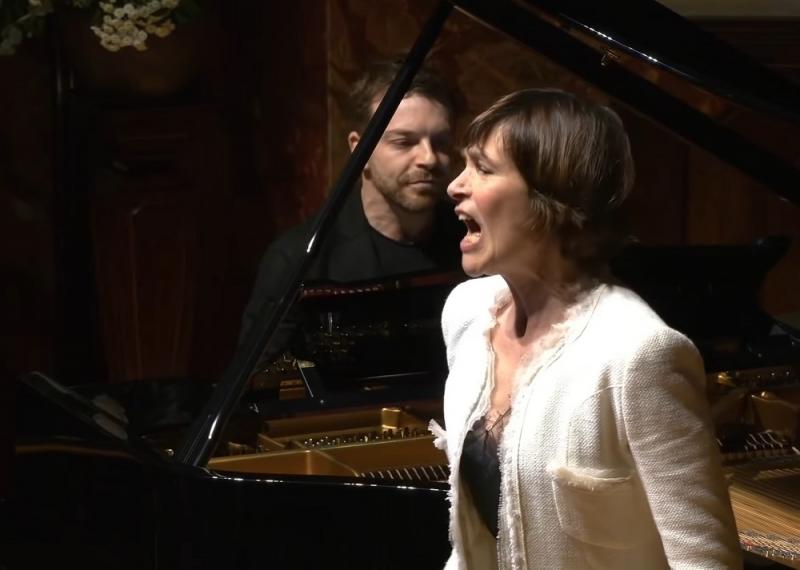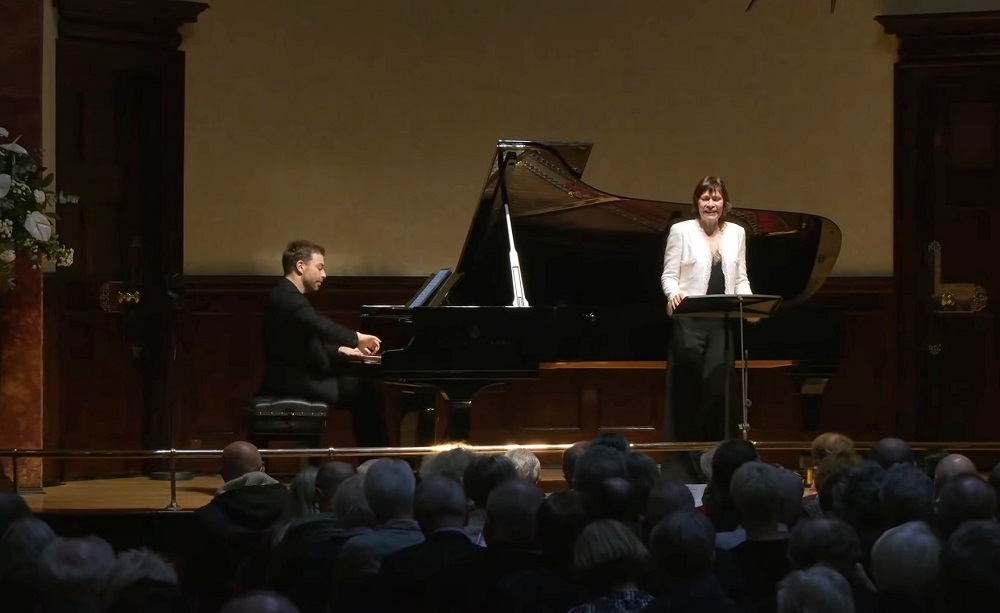Sandrine Piau, David Kadouch, Wigmore Hall review - the joy is in the detail | reviews, news & interviews
Sandrine Piau, David Kadouch, Wigmore Hall review - the joy is in the detail
Sandrine Piau, David Kadouch, Wigmore Hall review - the joy is in the detail
Superb pianist and programme-builder in perfect partnership with the great soprano

“It mustn’t be a surface thing. You have to put in the work,” Janet Baker once said. Sandrine Piau’s Wigmore recital of German song followed by French song was the perfect demonstration of that credo in action.
Whereas Piau described the repertoire, almost nonchalantly before performing their encore – Debussy’s “Beau Soir” – as a “new programme from David Kadouch”, there was no disguising the level of careful preparation and forethought which both singer and pianist had put into every nuance. The poetry and the music could be savoured and enjoyed completely; the results were overwhelmingly convincing.
Highlights, points where all Piau’s stagecraft and experience (notably as Constance in Poulenc’s Carmélites and as Mélisande) and her linguistic sensitivity came to the fore were in her singing of the words of Baudelaire, in settings first by Duparc and later by Debussy, and in settings of Francis Jammes by Lili Boulanger.
Both poets, in their very different ways, were outliers. Both were defended by other writers in the face of negative criticism to pursue and persist with their vision and their art. Jammes’ simple outlook on life might be encapsulated in the words on a darkened silver medallion in “Je garde une médaille d’elle”: “pray, believe, hope.” The Lili Boulanger settings from 1913-14 are sparse and intense. Every word and every note counts, and the detail which Piau and Kadouch brought to them made them unforgettable. The inflection, the waiting, the layers of meaning in the last line of the last of the three songs, “Que ce regard était passionné et calme”, need to be heard.  If Jammes’ language is innocent and direct, the intensity of Baudelaire’s evocations of sensuality and death have a timeless beauty and a different kind of intensity. The French language has nothing else like it. Here again, the way Piau and Kadouch were alive to every unexpected twist and turn was palpable. An impressionistic line such as “lune, eau sonore, nuit bénie” carried delight at the unexpectedness of each sensation, Piau soaring effortlessly into head-voice. This was just one of many quite remarkable moments. Piau also communicates and acts completely and authentically with her facial expression always reinforcing the meaning. And there was an irresistible moment in "Le Jet d'Eau" when the langourous triple-time in the accompaniment brought the hint of her starting to move to a slow and smoochy waltz.
If Jammes’ language is innocent and direct, the intensity of Baudelaire’s evocations of sensuality and death have a timeless beauty and a different kind of intensity. The French language has nothing else like it. Here again, the way Piau and Kadouch were alive to every unexpected twist and turn was palpable. An impressionistic line such as “lune, eau sonore, nuit bénie” carried delight at the unexpectedness of each sensation, Piau soaring effortlessly into head-voice. This was just one of many quite remarkable moments. Piau also communicates and acts completely and authentically with her facial expression always reinforcing the meaning. And there was an irresistible moment in "Le Jet d'Eau" when the langourous triple-time in the accompaniment brought the hint of her starting to move to a slow and smoochy waltz.
David Kadouch is a wonderful pianist. When Dmitri Bashkirov, an important teacher from his youth, passed away, Kadouch made a point of praising and remembering "his physical and moral dedication, his advocacy for repertoire". Those are characteristics which inform his own approach. In a German setting such as Schubert/Goethe “Heiss mich nicht reden”, the pianist has just four bars to set the mood and the pacing and to capture the audience’s attention. He did that remarkably. All through the recital his musicianship and empathy were exemplary. From the full-stretch Mendelssohnian busy-ness of Clara Schumann’s “Loreley” to the hushed finality of an angel passing through an empty house in the Debussy/Baudelaire “La mort des amants”, his playing was subtle and magnificent.
The programme was very cleverly constructed, too. At the point in it where we were taken from Germany to France, we arrived with a sonnet in 12-syllable alexandrines. For symmetry there was another one as the last piece in the programme. Between the Lili Boulanger and the Debussy we heard the recently-discovered final piano piece by Debussy, “Les soirs illuminés par l’ardeur de charbon”, the title, fittingly, a quote from Baudelaire. And the German section was book-ended by the Schubert and the Robert Schumann settings of “Kennst du das Land”.
We could have done without the sound of a mobile phone going off (in the second stanza of Schumann’s “Kennst du das Land”, and far more audible and distracting in the hall than on the radio recording), but the musicians seemed scarcely to notice.
On reflection, it somehow seems right that "The Society for the Promotion of Correct Pronunciation on Radio 3", a group of Facebook keyboard warriors, should get so hot under the collar whenever an announcer mispronounces the French soprano’s surname as “Pi-AOW!” (Andrew McGregor didn't). She’s worth it.
rating
Explore topics
Share this article
The future of Arts Journalism
You can stop theartsdesk.com closing!
We urgently need financing to survive. Our fundraising drive has thus far raised £49,000 but we need to reach £100,000 or we will be forced to close. Please contribute here: https://gofund.me/c3f6033d
And if you can forward this information to anyone who might assist, we’d be grateful.

Subscribe to theartsdesk.com
Thank you for continuing to read our work on theartsdesk.com. For unlimited access to every article in its entirety, including our archive of more than 15,000 pieces, we're asking for £5 per month or £40 per year. We feel it's a very good deal, and hope you do too.
To take a subscription now simply click here.
And if you're looking for that extra gift for a friend or family member, why not treat them to a theartsdesk.com gift subscription?
more Classical music
 Robin Holloway: Music's Odyssey review - lessons in composition
Broad and idiosyncratic survey of classical music is insightful but slightly indigestible
Robin Holloway: Music's Odyssey review - lessons in composition
Broad and idiosyncratic survey of classical music is insightful but slightly indigestible
 Bizet in 150th anniversary year: rich and rare French offerings from Palazzetto Bru Zane
Specialists in French romantic music unveil a treasure trove both live and on disc
Bizet in 150th anniversary year: rich and rare French offerings from Palazzetto Bru Zane
Specialists in French romantic music unveil a treasure trove both live and on disc
 Scottish Chamber Orchestra, Ibragimova, Queen’s Hall, Edinburgh review - rarities, novelties and drumrolls
A pity the SCO didn't pick a better showcase for a shining guest artist
Scottish Chamber Orchestra, Ibragimova, Queen’s Hall, Edinburgh review - rarities, novelties and drumrolls
A pity the SCO didn't pick a better showcase for a shining guest artist
 Kilsby, Parkes, Sinfonia of London, Wilson, Barbican review - string things zing and sing in expert hands
British masterpieces for strings plus other-worldly tenor and horn - and a muscular rarity
Kilsby, Parkes, Sinfonia of London, Wilson, Barbican review - string things zing and sing in expert hands
British masterpieces for strings plus other-worldly tenor and horn - and a muscular rarity
 From Historical to Hip-Hop, Classically Black Music Festival, Kings Place review - a cluster of impressive stars for the future
From quasi-Mozartian elegance to the gritty humour of a kitchen inspection
From Historical to Hip-Hop, Classically Black Music Festival, Kings Place review - a cluster of impressive stars for the future
From quasi-Mozartian elegance to the gritty humour of a kitchen inspection
 Shibe, LSO, Adès, Barbican review - gaudy and glorious new music alongside serene Sibelius
Adès’s passion makes persuasive case for the music he loves, both new and old
Shibe, LSO, Adès, Barbican review - gaudy and glorious new music alongside serene Sibelius
Adès’s passion makes persuasive case for the music he loves, both new and old
 Anja Mittermüller, Richard Fu, Wigmore Hall review - a glorious hall debut
The Austrian mezzo shines - at the age of 22
Anja Mittermüller, Richard Fu, Wigmore Hall review - a glorious hall debut
The Austrian mezzo shines - at the age of 22
 First Person: clarinettist Oliver Pashley on the new horizons of The Hermes Experiment's latest album
Compositions by members of this unusual quartet feature for the first time
First Person: clarinettist Oliver Pashley on the new horizons of The Hermes Experiment's latest album
Compositions by members of this unusual quartet feature for the first time
 Gesualdo Passione, Les Arts Florissants, Amala Dior Company, Barbican review - inspired collaboration excavates the music's humanity
At times it was like watching an anarchic religious procession
Gesualdo Passione, Les Arts Florissants, Amala Dior Company, Barbican review - inspired collaboration excavates the music's humanity
At times it was like watching an anarchic religious procession
 Classical CDs: Camels, concrete and cabaret
An influential American composer's 90th birthday box, plus British piano concertos and a father-and-son duo
Classical CDs: Camels, concrete and cabaret
An influential American composer's 90th birthday box, plus British piano concertos and a father-and-son duo
 Cockerham, Manchester Camerata, Sheen, Martin Harris Centre, Manchester review - re-enacting the dawn of modernism
Two UK premieres added to three miniatures from a seminal event of January 1914
Cockerham, Manchester Camerata, Sheen, Martin Harris Centre, Manchester review - re-enacting the dawn of modernism
Two UK premieres added to three miniatures from a seminal event of January 1914
 Kempf, Brno Philharmonic, Davies, Bridgewater Hall, Manchester review - European tradition meets American jazz
Bouncing Czechs enjoy their Gershwin and Brubeck alongside Janáček and Dvořák
Kempf, Brno Philharmonic, Davies, Bridgewater Hall, Manchester review - European tradition meets American jazz
Bouncing Czechs enjoy their Gershwin and Brubeck alongside Janáček and Dvořák

Add comment